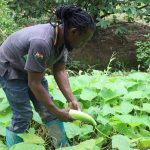Over the last few months, approximately 260 farmers from Canal Polder on the West Bank of Demerara benefited from infrastructural upgrades on their farms.
This was disclosed by Agriculture Minister, Hon. Zulfikar Mustapha during a community engagement in Canal Number One on Tuesday.
Minister Mustapha said prior to today’s engagement, farmers made requests for assistance with upgrading the internal drainage systems on their farms to improve their cultivation.
“When we were here the last time, you said that you needed help with your internal drains. We developed a programme and sent in a machine to start the works. To date, the machine has already completed 260 farmers’ holdings, upgrading their internal drainage system. We have another 200 to complete before the project ends. I’ve asked NDIA to deploy another machine so that we can get the job done faster,” the minister explained.
Responding to issues raised about drainage and irrigation, Minister Mustapha said the pump station being constructed in the area will be completed soon. He also said proper regulation of the water supply is necessary to ensure farmers have sufficient water during the dry season and do not experience flooding during the rainy season.

“We have a lot of intake pipes in this area. When the rain falls the water comes in then flooding occurs. This area is prone to flooding. This is why we are modernizing the drainage system on the West Bank (of Demerara). We have to have proper regulation of the water supply to ensure farmers have sufficient
water during the dry season, but at the same time, we have to also ensure you don’t experience flooding during the rainy season. Shortly, construction of the pump station will be completed. It has the capacity to discharge 126,000 gallons of water per minute. Furthermore, we are currently fabricating a metal door for
the sluice. In a few weeks that door will be installed,” Minister Mustapha said.
Minister Mustapha also told farmers that the government is working aggressively with CARICOM to remove the non-tariff barriers so that more products can be exported around the region. He said while some farmers are still practicing traditional methods of farming, in order for Guyana to become a food production hub, farmers have to embrace technology and climate-smart practices.






